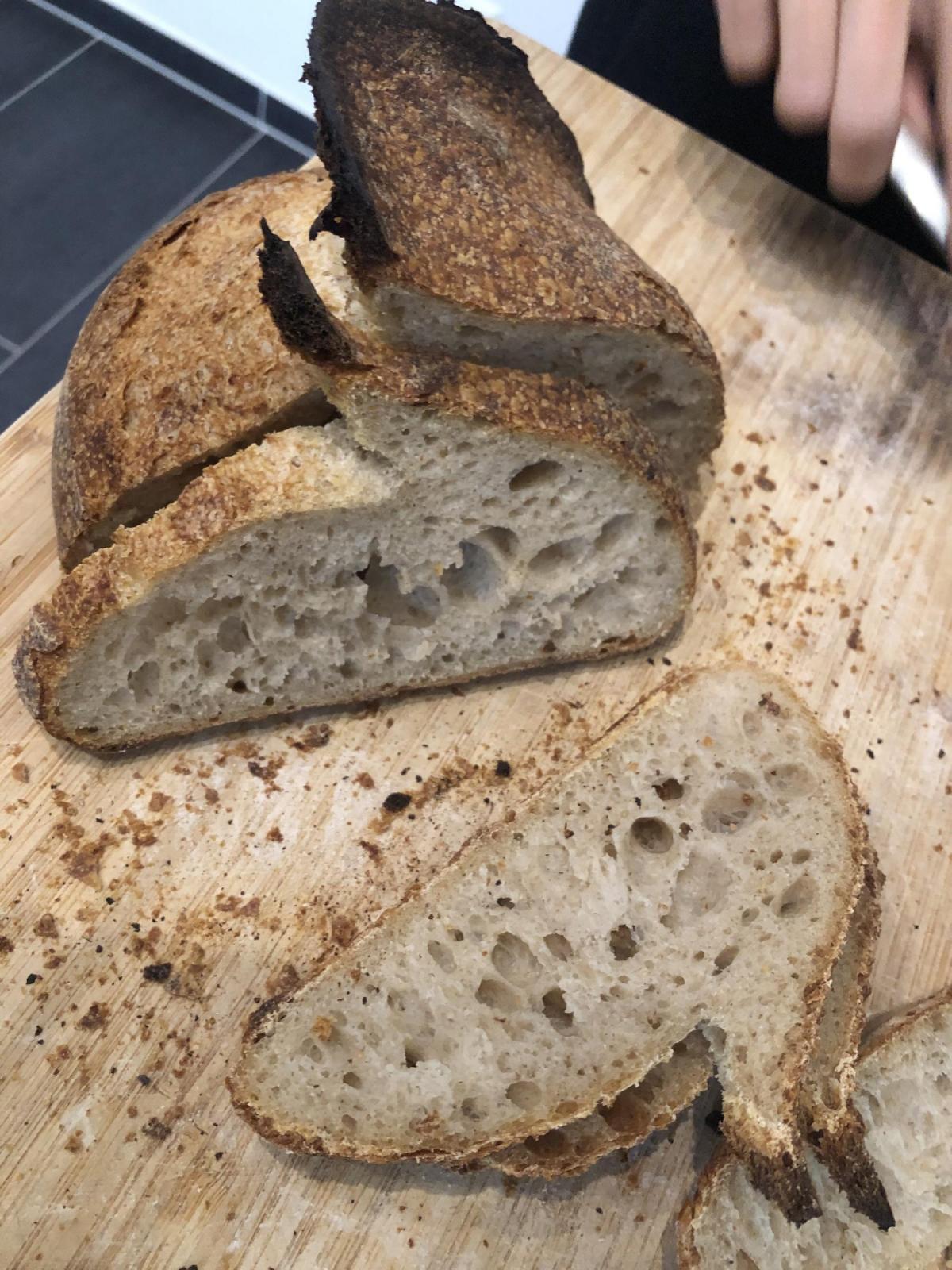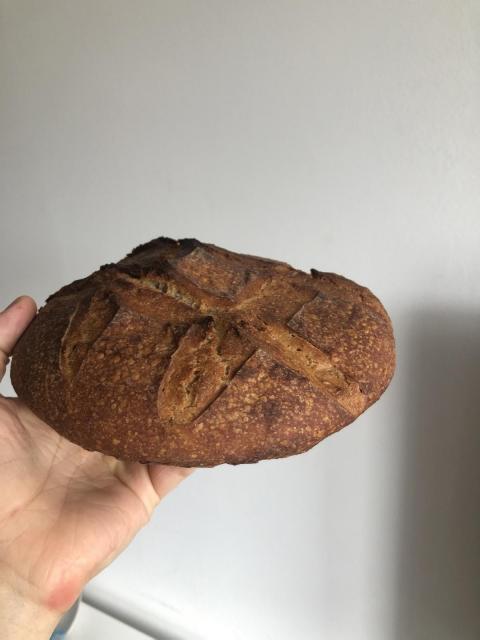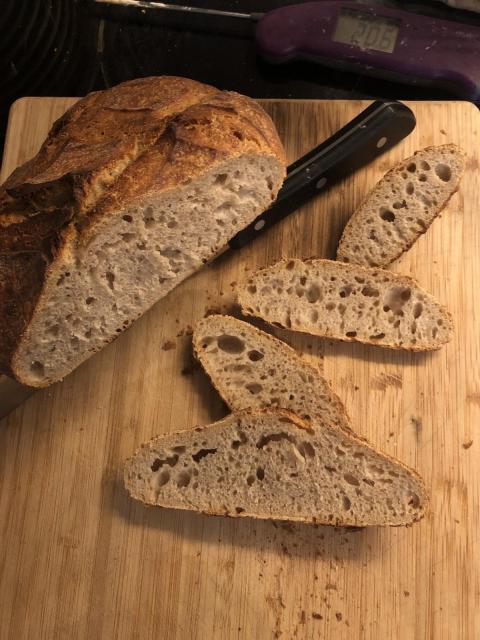
Absolutely baffled! Bread mystery! Please help! Update:mystery solved

Update: Thanks for all your input and help. Next bake was a huge success. The problem I think was a combination things. But seems like biggest culprit was over hydration, and underfermentation. And perhaps not the world's happiest starter.
So I fed my starter at a lower ratio 3 times a day until it was really cooperating, decreased hydration to 72%, did a mix of medium and medium-high white flour (11% & 12% protein), only 10% whole wheat flour. Skipped autolyse and did a long bulk (6 hours at about 21°C. Way better. So much more delicious! Thanks for all your advice!

Hi! I need some serious help. I have been baking every day for the last month and something is going very wrong and I cannot for the life of me figure it out. Apologies for long post I am desperate.
OK. So I've had real success in the past using the same flours, oven and techniques. However for some reason every loaf of the last month has turned out almost exactly the same, regardless of which parameters I change. They spread out in the oven, don't hold their shape and don't grow much. Splitting rather than growing at the scoring site.
I have varied my wholewheat percentage from 0% to 40% and most things in between. The white flour I use is 12% protein. Hydration has varied from 73% to 84%. Results are always the same. Collapse. I usually retard overnight in my cold fridge which doesn't get above 4°C. But I have also tried baking straight after an hour or 2 hours proving. The same.
I inoculate with 20% levain. I bulk ferment for about 3.5-4 hours if the dough is 25-26°C. I go for more like 5 or 6 hours if it's as low as 21°C. I see some volume increase and good signs of fermentation. I shape tightly and the dough usually feels and looks beautiful after shaping. But, as soon as I score it I can tell it won't do well in the oven.
I thought it might be my starter being too acidic? But, I changed to regular feeding 2-3 times a day, changing the container each time, only feeding just as it was peaking. And I only add the levain to the dough just as it is peaking and still strong not liquid. And it doesn't smell especially sour and it grows well.
I autolyse for between 1-2 hours for white flour and 2-5 hours for whole wheat flours.
I bake in a dutch oven.
I was concerned I wasn't developing enough of a gluten network? I had had success before with just slap and folds, then stretch and folds every half hour, between 3 -6 times depending on feel. Ideally none for the last hour or 2 of bulk. I tried doing bench kneading, then lamination, then coil folds. That didn't work. The same collapse result.So then I went back to a minimal approach of just some slap and folds and a few stretch and folds.
The dough is strong at the start of bulk and after a slaps or stretch and folds or coil folds, but it seems to lose strength as bulk progresses, even though it increases in volume. But it doesn't always seem to lose strength during bulk. But I think I shape pretty well? Nice and tight but not too tight. Sometimes I do preshape sometimes I don't. But the result is always the same. Ok. Sorry for long post. Here are some photos. Please any advice you have would be amazing.
This is an example of a good loaf I made that was 40% whole wheat and 77.5% hydration: I have no idea why this one turned out great. It was a month ago and everything else since has been terrible:






Welcome to TFL.
We think we use the "same ingredients" each time we bake, but in reality that is not true.
The water can be different. The water utility may change their source, or how they treat the water, adding more chlorine or switching to chloramine. A new water pipe may have been installed somewhere in the system between your kitchen sink and the water plant. An old pipe may have gone bad and is now adding something to the water. Water contamination could even be causing the water pipes to erode.
---
The miller may buy grain from a different farmer. Or a new batch or harvest year was started.
If the miller is not a large modern mill that makes constant adjustments to maintain specifications from batch to batch, field to field, farm to farm, year to year, then the flour changes.
The wrong flour may be put in the bag somewhere along the line. Human error -- label says X, but the flour is actually Y.
The flour may gain or lose moisture along the route from miller, to warehouse, to store, to your home, or while sitting on the shelf.
Rainy season may set in, and your bag of flour can gain moisture while sitting in your pantry. The last half of the bag could be higher moisture than the first half of the bag.
--
Your starter can change for bad or good, especially if you feed it high ratios of whole grain which will introduce new micro-organisms.
Your starter can change for no apparent reason, becoming stronger or weaker.
If your starter gets too acidic and goes "proteolytic" (which I don't fully understand) then it can turn into a "bread killer." I forget what the signs are, maybe "turning soupy". Others will have to help if that is the case.
Changes in flour can cause changes in the starter too.
--
Your loaves look over-hydrated, and perhaps low gluten formation. So too much water. And possibly, the flour you're using now has less gluten than before.
And maybe over-fermented, just guessing. But you have good expansion at the score line, so maybe not.
But this description: "Splitting rather than growing at the scoring site." Indicates over-fermentation.
I'd suggest working on the basics first. Drop the hydration to 65%. Use commercial yeast to learn what well-fermented dough looks like. (It does get way more puffy than you might think at this point.)
If you insist on using the starter, drop the hydration to 65% and stop soaking your flours. 0.5 h is enough to be able to mix it by hand. Even if the dough gets proteolytic, you should still be able to get something out of it.
Try to get your starter more active.
The crumb to me is classic underfermentation. Relatively tight crumb and then some larger tunnels running through the crumb. I would surmise that particular loaf was a bit over hydrated and that led to the spreading. It doens’t appear overfermented to me, it does have the profile, but I don’t see evidence of gluten breakdown nor do I see a mostly open crumb, the crumb is too tight to be overfermented.
”I inoculate with 20% levain. I bulk ferment for about 3.5-4 hours if the dough is 25-26°C”.
For my starter which is very active if I were to make a levain and then use it at peak at 20% based on total levain weight to total flour, if the dough had about 25-30% whole grain, it would require far more than 3.5-4 hours of fermentation at 25-26ºC. At 27ºC it would probably need about 6-6.5 hours before I would end bulk fermentation and that would be at about 60% rise by aliquot jar.
So I’d say underfermented and over hydrated. Extend your bulk fermentation, considering using an aliquot jar to measure the rise that way you can adjust from bake to bake to improve. Also, reduce your hydration and try to stick with one formula for a while and repeat it until you are happy with it. It is hard to improve when you switch formulas frequently because you’re always moving the target.
Benny
I agree that underproofing is a strong suspect. Don’t use the starter until it is extremely bubbly. Don’t end bulk ferment until the dough is very definitely increased in volume and has many visible bubbles. The other users are correct in that lowering hydration is a smart troubleshooting step. Also, focus on lower whole wheat percentage until you get good consistent results. i.e. 0-10%.
Hey everyone. Thanks for all your assistance and advice. Yeah I have had success with less hydrated loaves. I will get back to that and get some wins under my belt. Less hydration and more fermentation!
I have of course had some disasters with over fermentation, but I will push it more! Presumably though, the significant spreading is a result of over-hydration, rather than the under fermentation? Or can under fermentation lead to such spreading?
No typically unless there wasn’t enough structure built in your dough an underfermented loaf doesn’t typically spread, in fact it may have excessive oven spring from huge gas tunnels in it. I believe yours spread because of overhydration.
Thanks for your help everyone! Last loaf looked great. I'm back on track.